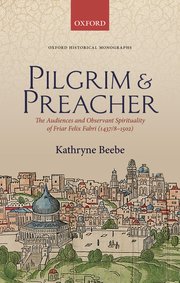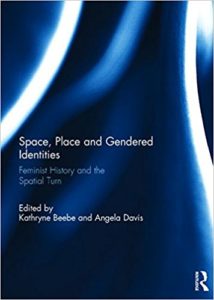Kathryne Beebe’s research interests include pilgrimage, religious history, gender history, the cultural history of spirituality, the history of the book, and the digital humanities. She is a scholar of late-medieval Europe, concentrating on the area of what is now southwestern Germany, and of European pilgrimage to the Holy Land, both physically and in the imagination.
Her monograph, Pilgrim and Preacher: the Audiences and Observant Spirituality of Friar Felix Fabri (1437/8–1502), Oxford Historical Monographs. (Oxford, UK: Oxford University Press, 2014), employed cross-disciplinary insights from anthropology, literature, and history to examine how the Dominican writer and pilgrim, Felix Fabri, was influenced by the far-reaching religious reform effort known as the Observant movement, and how he refashioned his pilgrimage experiences into Latin and vernacular German texts for different audiences.
Currently, Kathryne is engaged upon a research project on imagined, or “virtual,” pilgrimage in the late Middle Ages, where she is investigating the connection between spiritual pilgrimage (for travelers who journeyed only in the imagination) and Observant religious reform in medieval Europe. She is also pursuing several Digital Humanities projects concerning religious reform and monastic life, most notably The Digital Observance Network, a collaborative project with James D. Mixson of the University of Alabama.
In Summer 2018, Kathryne was a Visiting Research Scholar at the University of Tübingen, at the Sonderforschungsbereiche Projekt 923: “Bedrohte Ordnungen” Subproject G02: Geistliche Frauengemeinschaften im 15. und 16. Jahrhundert: Ordnungsvorstellungen und Bedrohungskommunikation in Reform und Reformation (Spiritual Women’s Associations in the Fifteenth and Sixteenth Centuries: Concepts of Order and Communication of Threat in Reform and the Reformation), directed by Prof. Dr. Sigrid Hirbodian. In Summer 2019, she was a DAAD (Deutscher Akademischer Austauschdienst) Research Fellow and worked on the Digital Humanities project: Visualizing Observance: Social Networks and the Spread of Reform in Late-Medieval Germany, at the Institut für Geschichtliche Landeskunde und Historische Hilfswisse at the University of Tübingen.
Books

Pilgrim and Preacher: the Audiences and Observant Spirituality of Friar Felix Fabri (1437/8–1502). Oxford Historical Monographs. Oxford, UK: Oxford University Press, 2014.

Space, Place and Gendered Identities: Feminist History and the Spatial Turn (edited with Angela Davis). London, UK: Routledge, Taylor & Francis Group, 2015. Published in paperback 2017.
Book Chapters
“Felix Fabri und die Klosterreformen des 15. Jahrhunderts.” In Die Welt des Frater Felix Fabri, edited by Folker Reichert and Alexander Rosenstock, 75–87. Series: Veröffentlichungen der Stadtbibliothek Ulm. Weißenhorn: Anton H. Konrad Verlag, 2018.
“The Nachleben of the Gottesfreunde: Heinrich Seuse and Felix Fabri.” In Friends of God. Vernacular Literature and Religious Elites in the Rhineland and the Low Countries (1300–1500), edited by Wybren Scheepsma, Gijs van Vliet, and Geert Warnar, 273–289. Series: Temi i Testi. Rome: Edizioni di Storia e Letteratura, 2018.
“The Jerusalem of the Mind’s Eye: Imagined Pilgrimage in the Fifteenth Century.” In Visual Constructs of Jerusalem, edited by Bianca Kühnel, Galit Noga-Banai, and Hanna Vorholt, 409–420. Cultural Encounters in Late Antiquity and the Middle Ages 18. Turnhout: Brepols, 2014.
“Knights, Cooks, Monks and Tourists: Elite and Popular Experience of the Late-Medieval Jerusalem Pilgrimage.” In Elite and Popular Religion, edited by Kate Cooper and Jeremy Gregory, 99–109. Studies in Church History 42. Martlesham, UK: Boydell & Brewer, 2006.
Co-Edited Journal, Special Issue
Women’s History Review. Special Issue: “Space, Place and Gendered Identities: Feminist History and the Spatial Turn.” Edited with Angela Davis and Kathryn Gleadle. Vol. 21:4 (2012).
Articles
“Introduction: Space, Place and Gendered Identities: Feminist History and the Spatial Turn,” with Angela Davis and Kathryn Gleadle. Women’s History Review 21:4 (2012): 523–532.
“Reading Mental Pilgrimage in Context: the Imaginary Pilgrims and Real Travels of Felix Fabri’s ‘Die Sionpilger’.” Essays in Medieval Studies 25 (2008): 39–70.
Encyclopedia Articles
“Knighting of Pilgrims.” In Encyclopedia of Medieval Pilgrimage, edited by Larissa J. Taylor et al., 316–317. Leiden: Brill, 2009.
“Return from Pilgrimage.” In Encyclopedia of Medieval Pilgrimage, edited by Larissa J. Taylor et al., 631–633. Leiden: Brill, 2009.
Book Reviews
“Pilgrimage and Pogrom: Violence, Memory, and Visual Culture at the Host-Miracle Shrines of Germany and Austria. By Mitchell B. Merback. Chicago, IL and London: University of Chicago Press. 2012.” German History 32:3 (2014): 456–458.
“The Itineraries of William Wey. Edited and Translated by Francis Davey (Bodleian Library, Oxford, 2010).” Bodleian Library Record 25:1 (April 2012): 12–15.
“Cyrus, Cynthia J. The Scribes for Women’s Convents in Late Medieval Germany. Toronto: University of Toronto Press, 2009.” The German Quarterly 82:3 (Summer 2010): 373–374.
“Atlas of Medieval Europe, eds. David Ditchburn, Simon MacLean, and Angus MacKay (London: Routledge, 2007).” The English Historical Review (2010): CXXV (512): 142–143.
“O. R. Constable, Housing the Stranger in the Mediterranean World: Lodging, Trade and Travel in Late Antiquity and the Middle Ages (Cambridge: Cambridge University Press, 2003).” Journal of the Oxford University History Society 1 (Hilary 2004). https://sites.google.com/site/jouhsinfo/beebe02.pdf?attredirects=0.
